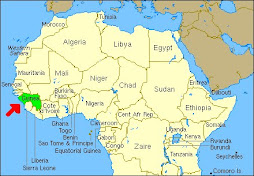November 2008
Several Peace Corps Volunteers have described to me a skill that they have acquired over the course of their two years in Cameroon—an ability to zone out, blank their minds, for hours at a time.
When you first hear this, it seems somewhat shocking. I can’t help but calculate my former hourly wage and ask, really? $XX lost simply gazing into space?
It’s a survival strategy—for dealing with tediously long bus rides too crammed to read, conversations where one insists on telling you a litany of things you are already know (tune back in just in time to laugh or nod, as appropriate), or six hour staff meetings. As one volunteer said to me, “My Cameroonian co-workers have to sit through the staff meeting too, so why shouldn’t I? That’s exactly how you understand how people have to live here—you wait with them. You share their stories, and their frustrations.” And I ask myself, because I happen to come from a culture where time is money, to what extent do I want to use that as an excuse to skip out on the awful moments of waiting?
This morning was a classic example. A 9am rendez-vous with the mayor of Mokolo. He shows up at about 11:30am. I’m trying my dangdest to sit in small-talk solidarity with my Cameroonian colleagues, but by around 11am, my impatience wins over, I break down, find a place to sit, and whip out my book. Reading is one of many things I’d rather do than… just sit. Solidarity takes a hit. Not everybody has a book to read.
To me, that Peace Corps zone-out seems dangerous. One volunteer who is preparing to return to the U.S. laughingly said to me that he’s worried about just how good he’s become at tuning out. I don’t want to tune people out. I want to believe that what they have to say is worthwhile, or that I could at least steer a conversation toward useful and relevant information. People have told me that my patience will build with time, but there is a part of me that laughs and thinks, they just don’t know me. Another part of me says, and why should I allow my patience to grow? So that I can better excuse the status quo? Although I realize that some adapting to the Cameroonian pace and culture will help me, I also think that a complacent acceptance of the status quo is not what this country needs. Complacent people have never changed things. To bring about some level of change, I think strong emotion—be it fear, grief, hope for something better, or maybe even a healthy dose of impatience—is necessary. So for the moment, I’m not yet going to blank out, stifle my impatience, or believe that my time is not worthwhile. Check back with me on that subject in two years!
And so now, July 2010.
I can’t help but laugh because… I was right. Self-fulfilling prophesy? Maybe. I’m no more patient than I ever was. But I know how to better deal with situations now. I know the things to say or the jokes to make that can help me get what I want and put everyone at ease. Yet, whether I’ve got the cool and composure to say what I’m supposed to, when I’m supposed to, is still another question. It’s so gratifying when it works. I make a joke that helps me get the price I want while bargaining in a market, or a knowing comment that generally convinces everyone that the nassara is not that much of a cold-hearted foreigner.
But it’s true—I still can’t and won’t do six-hour meetings. I will sometimes steer conversations toward what I think is useful, after I’ve gone through the minimal and required greetings and pleasantries. And maybe I’m missing out on something there—that which other people think is important—that’s what I’m here to learn, right? I’ll never be as patient and kind as some other Peace Corps Volunteers. But I’ve been lucky enough to collaborate and spend time with those volunteers, and they’ve taught me invaluable lessons. I think the key is to channel the impatience, the desire for change and for not settling, and to seek something useful out of it, instead of a festering frustration at the systems that create these situations. Some people are capable of blanking out. For better or for worse, I am not.
Truly, my closest Cameroonian friends are those that can and do work on more “American time,” who are busy, who don't like to settle. They fuss at me if I show up late for a meeting. An interesting anecdote. My best friend in town is Jacques. Last year we were out having a drink when he let slip that his birthday had just passed. “Jacques!” I said, “Why didn’t you tell me?! Your birthday! We would have celebrated! What did you do?!”
“I cried,” he responded. “Because I set certain goals for myself to have attained in that year, and they didn’t happen.” Jacques is one of so very few Cameroonians I know who would ever say that.
So what to do? Support and encourage the Jacques who are out there? Plant seeds, just show a different way of doing things? And what about the situations where I just have so little control, the waiting for mayors and other people deemed more important than I? Those are the moments, with quiet resignation, that I am grateful to return to America. I don’t know what to tell Cameroonians to do, as important people determine their future while they… wait. I’ve felt the frustration, and at times I’ve run from it, deemed it not worth my time and effort, but only in feeling the frustrations have I learned and understood, if only for a moment, the struggles of other people. I wish I could say I struggled and waited in solidarity at all times; I didn’t. I’m grateful I had the opportunities I did to learn, and I’m humbled that so many people here are so very much more patient, persevering, and determined than I am. Cameroon demands it—both for survival, and to make the changes we hope to see.
I’m grateful to a friend who recently sent me this quote. It’s the type of thing I need to tape to my wall, stick in my wallet, and keep in my heart as a reminder of who I want to be, as I forge on into other future work such as this, in places such as Cameroon. I leave you with this, from Teddy Roosevelt’s 1910 speech, entitled The Man in the Arena:
It is not the critic who counts; not the man who points out how the strong man stumbles, or where the doer of deeds could have done them better. The credit belongs to the man who is actually in the arena, whose face is marred by dust and sweat and blood; who strives valiantly; who errs, who comes short again and again, because there is no effort without error and shortcoming; but who does actually strive to do the deeds; who knows great enthusiasms, the great devotions; who spends himself in a worthy cause; who at the best knows in the end the triumph of high achievement, and who at the worst, if he fails, at least fails while daring greatly, so that his place shall never be with those cold and timid souls who neither know victory nor defeat.


1 comment:
I'm a member of the most recent Peace Corps Volunteers selected to serve in Cameroon (tentative departure in mid-September)! I'm anxious to continue reading your blog as I prepare to go through the same timeline of experiences soon. If you provide me your email address, I'd love to ask you a few questions as I gear up to leave the United States. Thanks in advance,
-Charmayne (charmayne.cooley@gmail.com)
Post a Comment